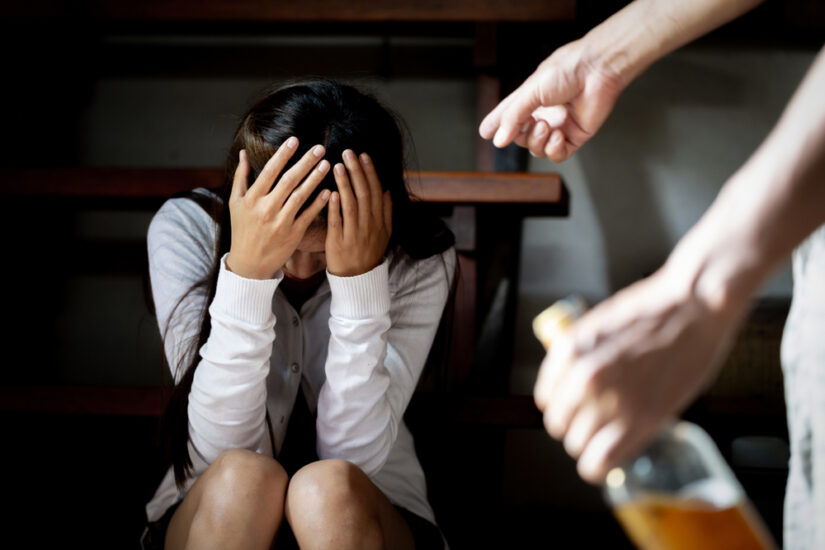Domestic Violence Attorney Miami
If you’ve been charged with a crime of domestic violence, in addition to the usual penalties, you can be labeled a domestic offender — a designation that carries a social stigma in addition to legal consequences. Jonathan Blecher is a Miami domestic violence lawyer who has built his reputation defending the rights of the accused. Contact his Miami, FL, criminal defense law firm to schedule a consultation. If Attorney Blecher accepts your case, he will begin building your defense immediately.

What is Domestic Violence?
Domestic violence is not in and of itself a crime. It is a label attached to other crimes of violence when specific conditions exist. Under Florida statute 741.28, in order for a crime to be considered domestic violence, there must be a domestic relationship. These include:
● Spouses
● Former spouses
● Persons related by blood or marriage
● Persons who reside together as if a family or have had this arrangement in the past
● Persons who have had a child in common, regardless of marriage or whether they have ever lived in the same household
Crimes that qualify for the domestic violence designator include assault, aggravated assault, battery, aggravated battery, kidnapping, false imprisonment, sexual assault, sexual battery, and other violent crimes.
Domestic Violence Charges Under Florida Law
If you’re convicted of a domestic crime, in addition to the penalties for the underlying crime, the courts can also require a 26-week Batterer’s Intervention Program (BPI), 12 months probation, 10 days in county jail for a first offense if the victims were injured, and additional community service hours. Individuals convicted of domestic violence are frequently subjected to a restraining order, as well.
Types of Domestic Violence Cases
The following are the crimes most frequently associated with domestic violence and domestic relationships.
Assault
In Florida, assault means a threat or act that creates a well-founded fear that violence is imminent. This includes verbal threats and threats by gestures. Assault is a second-degree misdemeanor in Florida.
Battery
Florida defines battery as intentionally striking, touching, or causing physical harm to another person against their will. In Florida, battery is a first-degree misdemeanor.
Aggravated Assault
An aggravated assault is an assault carried out with a deadly weapon without the intent to kill the victim. Aggravated assault is a third-degree felony crime.
Aggravated Battery
For a battery to be charged as aggravated battery, the state must prove that the accused committed a battery with a deadly weapon or caused great bodily harm, permanent disfigurement, or permanent disability. A simple battery can also become an aggravated battery if the defendant knew or should have known that the victim was pregnant at the time of the attack. Aggravated battery is a second-degree felony offense.
False Imprisonment
It is unlawful in Florida to restrict or confine a person’s movement against their will by force or threat. False imprisonment is a third-degree felony in Florida.
Kidnapping
Like false imprisonment, kidnapping means to use force to hold, confine, or abduct a person against their will, but with the intent to commit another felony, inflict harm, or hold them for ransom. This is a first-degree felony unless the victim is under the age or 13, in which case it becomes a life felony.
Sexual Battery
Sexual battery means oral, anal, or vaginal penetration or union with the sexual organ of another. It also includes contact with objects. There are numerous criminal offenses that fall under the sexual battery statute, ranging from first-degree felonies to capital felonies.

Violation of a Restraining Order
Violation of a restraining order in Florida is a first-degree misdemeanor in Florida.
Stalking and Aggravated Stalking
In Florida, stalking means to wilfully follow, or harass, an individual. Depending on the defendant’s behavior, it can be charged as stalking (misdemeanor) or aggravated stalking (felony). Also, if the victim has a restraining order, the stalking offense becomes an aggravated felony.
Witness Tampering
It is illegal to coerce, threaten, or intimidate a witness in Florida. Witness tampering is a third-degree felony crime.
All domestic violence crimes are a serious matter. If you’re facing domestic violence charges — whether they are misdemeanors or felonies — you should contact an experienced domestic violence attorney immediately.
Penalties for a Domestic Violence Conviction in Florida
Your legal exposure depends on the level of the crime you’ve been charged with. While a domestic violence designator can make your punishment worse, the maximum penalties with regard to jail or penalties work similarly, regardless of whether your offense is domestic violence or not.
● Second-Degree Misdemeanor – Punishable by up to 60 days in jail and $500 in fines.
● First-Degree Misdemeanor – Punishable by up to one year in jail and $1,000 in fines.
● Third-Degree Felony – Punishable by up to five years in prison and $5,000 in fines.
● Second-Degree Felony – Punishable by up to 15 years in prison and $10,000 in fines.
● First-Degree Felony – Punishable by up to 30 years in prison and $10,000 in fines.
● Life Felony – Punishable by life in prison and $15,000 in fines.
● Capital Felony – Punishable by life in prison or death in the case of a homicide.
Evidence in a Miami Domestic Violence Case
When the police respond to an incident of domestic violence, they are usually trying to piece information about the incident together after the fact. In cases of domestic violence, conflicting testimonies are common. Consequently, the arresting officers make their decisions based on corroborating evidence, such as:
● Visible physical injuries
● The apparent physical abilities of the subjects involved
● Background noise during the 911 call
● The nature of the damaged property
● Spontaneous utterances by the defendant
● Eyewitness testimony if anyone else was present.
As a top-tier Miami domestic violence lawyer, Jonathan Blecher will review all of the evidence against you before mounting a legal defense. In many cases, the police make mistakes in collecting evidence. If that happened during your arrest, attorney Blecher will challenge it in court. This could lead to a reduction of charges or an acquittal.
Orders of Protection in Florida
Restraining orders are common in domestic violence cases. If an alleged victim serves you with a temporary restraining order, you will not be able to contact them for 15 days. It’s in your best interest to respect the conditions of the injunction. Otherwise, you could face additional criminal charges.
Defenses in Domestic Violence Cases
While every domestic violence case is different, there are some common elements that an experienced criminal defense lawyer, like Miami criminal defense attorney Jonathan Blecher, can use to build a defense.
Lack of Physical Evidence
When law enforcement officers elect not to arrest either party on a domestic violence call, they run the risk of future harm to one or both parties. To mitigate this danger, the police frequently arrest alleged abusers based solely on the testimony of the victim. In the absence of physical evidence, it’s difficult for prosecutors to prove domestic violence charges beyond a reasonable doubt.
Coerced Confession
All individuals suspected of a crime have the right to remain silent. Law enforcement officers cannot force suspects to answer questions or badger to get a confession. If the police used coercive tactics to obtain a confession or even a witness statement, the defendant’s attorney could file a motion to suppress, which often means the end of the prosecutorial case.
Illegal Search
When the police respond to a domestic violence incident, they may ask to search the home, looking for the alleged victim. If one party refuses, the other can provide them with permission, or they can walk through the home to ensure that all who are present are safe, even without permission. However, they cannot check in enclosed spaces where it’s not possible for a person to fit (i.e., drawers, cabinets, etc.). If the police uncover evidence during an illegal search, a diligent defense lawyer can file a motion to suppress it.
Victim Withdraws Their Statement
In Florida, the police do not necessarily require the cooperation of the victim to file domestic violence charges. Because victims are frequently afraid of retaliation from their abusers, the state will often file charges on their behalf. However, without a statement from the victim, it can be very difficult to prove domestic violence.
However, a defendant charged with domestic violence crimes needs to be cautious about trying to get an alleged victim to withdraw their statement. This can be interpreted as witness tampering — a third-degree felony punishable by up to five years in prison.

How We Can Help You With Your Case
When you speak with criminal defense Attorney Jonathan Blecher, it’s important that you’re forthcoming about your case. Anything you discuss in the past incident or incidents in question is covered under attorney-client privilege. If Attorney Blecher accepts your case, he can begin building your defense. This includes:
● Collecting and reviewing all documentation, including police reports and supplements, the probable cause affidavit, the 911 call recording, photographic evidence, medical reports, etc.
● Subpoena and depose all witnesses, including the victim and arresting officers.
● Reviewing all police procedures and interrogation techniques.
● Discussing plea negotiations with the assistant state attorney assigned to the case.
● Filing motions to suppress evidence improperly obtained by the police.
● Representing you in restraining order hearings.
● Fighting for your legal rights in court.
Mr. Blecher will explore every avenue of defense. In some circumstances, however, it is in the defendant’s best interest to accept a deal offered by the state attorney. Particularly if it helps to keep a domestic violence charge offer of their criminal history.
Frequently Asked Questions About Domestic Violence
If you’ve been arrested for domestic violence in Miami, FL, we understand that you have questions and concerns. Here are some of the most commonly asked questions by individuals charged with domestic violence.
Can someone drop domestic violence charges in Florida?
If the victim signed an affidavit, they can request that the charges be withdrawn. However, in many cases, the state files charges on behalf of the victim. If this occurs, the state has the final say in determining whether or not to drop the charges.
Under no circumstances should you attempt to contact the alleged victim to ask them to drop the charges against you. You could open yourself up to witness tampering charges.
Why do parents accused of domestic violence need legal representation?
If you’ve been accused of domestic violence against your partner, they may file a restraining order that makes it difficult to exchange your children. Additionally, a domestic violence conviction may adversely impact child custody proceedings. A criminal defense attorney can not only help you avoid jail time but can also minimize the collateral damage from an arrest.
Miami Domestic Violence Lawyer for the Accused
If you’ve been arrested for a domestic violence crime, you could be facing jail or prison and fines. Contact an experienced domestic violence attorney in Miami, Florida. Call Jonathan Blecher today!


